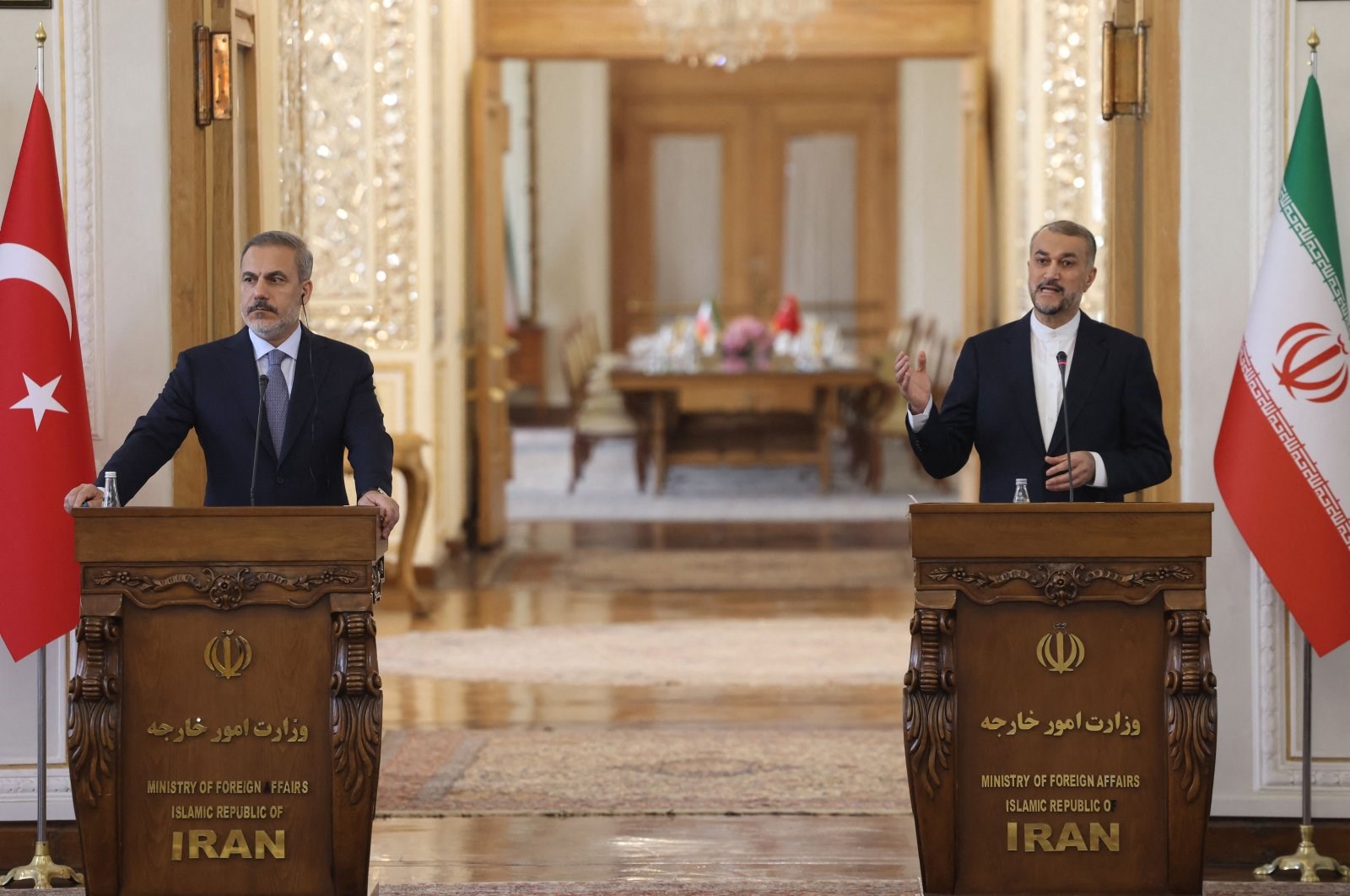Iran to Turkey: No restrictions on regional transit routes accepted
In a joint press conference held in Tehran, Iranian Foreign Minister Hossein Amir-Abdollahian and his Turkish counterpart Hakan Fidan have discussed a range of crucial topics.
-

Foreign Minister Hakan Fidan (L) and his Iranian counterpart Hossein Amir-Abdollahian hold a joint news conference in Tehran, Iran, Sept. 3, 2023. (AFP)
Iranian Foreign Minister Hossein Amir-Abdollahian made a statement, on Sunday, emphasizing Tehran's commitment to opening transit routes in the region and the strengthening of trade ties with Turkey. This statement was made during a joint press conference with Turkish Foreign Minister Hakan Fidan in Tehran.
Iranian Foreign Minister Hossein Amir-Abdollahian welcomed his Turkish counterpart, Hakan Fidan, today at the Foreign Ministry headquarters in Tehran. This visit marks a significant step in strengthening diplomatic ties between the two nations.
Amir-Abdollahian mentioned that the meeting included detailed and productive discussions on various aspects of bilateral cooperation between the two countries. He noted that the target trade volume between Iran and Turkey is 30 billion euros and that they are currently halfway there. He highlighted positive economic agreements reached during a recent visit by Iran's deputy foreign minister for economic diplomacy to Ankara.
Regarding transportation and transit, Amir-Abdollahian emphasized that the transit routes in the region should be viewed as complementary rather than competitive between Iran and Turkey, thus enhancing cooperation.
Palestine is a priority
Elsewhere in his remarks, Amir-Abdollahian mentioned an upcoming meeting of the committee for the transfer of detainees in Ankara after five years and discussed issues related to water, including concerns about droughts and the fair distribution of Aras River water.
"Today, in a conversation with my Turkish counterpart, we talked about the continuation of these talks and Turkey's serious attention to the Aras River issue and the issue of complete, accurate, customary, and conventional transfer [of water] that has been carried out over many years to areas in the northwest of Iran in water basins originating in Turkey," he said.
On regional matters, the Iranian Foreign Minister mentioned both countries' active efforts against Islamophobia and their focus on Palestine and Al-Quds as a priority for Islamic and regional countries. He also stressed their opposition to the presence of the Zionist regime in the region, which they see as causing division and unrest.
Amir-Abdollahian discussed the Caucasus region, calling for a shift from tension and conflict to peace and cooperation. He expressed support for agreements and dialogues between Armenia and Azerbaijan and emphasized opposition to any geopolitical changes in the region that would limit historical transit routes.
He suggested that concerns between Turkey and Syria should be resolved through diplomacy and dialogue, addressing issues related to terrorism, border security, and refugees through cooperation.
The Foreign Minister mentioned discussions about Ukraine, and Afghanistan, and the potential for a tripartite meeting between Iran, Saudi Arabia, and Turkey to focus on economic cooperation, business, and investment in the future. He also highlighted plans for a tripartite meeting between Iran, Azerbaijan, and Turkey to strengthen cooperation in establishing peace and stability in the Caucasus.
The big picture
Notably, this visit comes on the heels of Fidan's recent trip to Moscow, where he engaged in discussions with his Russian counterpart, Sergey Lavrov, and his visit to Iraq.
Despite divergences in their stances on several issues, including the war in Syria and relations with their neighbor Azerbaijan, Iran and Turkey maintain robust economic and political ties.
It is worth noting that Erdogan has repeatedly expressed Ankara's desire for further regional cooperation making reference to the quadrilateral cooperation of Turkey, Iran, Syria, and Russia.

 4 Min Read
4 Min Read








